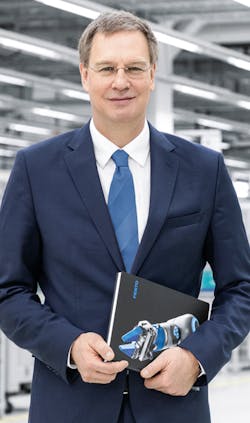Industrial Transformation: An Industrial Control Company Shifts During the Pandemic
The coronavirus has placed a damper on virtually all industry events this year, forcing enterprises to shift focus. By way of example, German industrial control and automation company Festo fell prey to the effects of the pandemic after Hannover Messe—one of the world’s largest trade fairs—was cancelled.
Instead, the firm’s pneumatic and electrical automation technology will be taking to the virtual stage. Festo will be joining a host of exhibitors at Hannover Messe Digital Days, slated to launch July 14.
“The coronavirus has been the most important driver for digitalization worldwide,” Kriwet said. “It has led to a change of the behavior of our customers, but also requires us to change.”
Digital Drives Productivity
Thanks to a developed digital infrastructure, Festo office colleagues were able to make a near-seamless transition to working remotely. However, Kriwet reported the coronavirus posed challenges for work on the production floor, as it still requires the worker to be in very close proximity to machinery.
Still, for Festo, the special challenges posed by the pandemic have spawned future opportunities with Industry 4.0. “First of all, we saw a huge demand in some products because of panic buying,” said Kriwet. “That led to the need to react very flexibly to shift production volume to focus on certain products, and to react fast, including the management of the complete supply chain.”
The second issue was the shift in stability of Festo’s supply chain. Kriwet explained that because some sub-suppliers were closed, Festo needed to be flexible and reactive in order to keep production running.
The third issue was a sudden demand for system-critical products in the medical technology and food-and-beverage industries. Festo saw a huge spike in demand for components for emergency respirators, for example.
Effects on Industry
Another globalization trend expedited by the pandemic is that factories will move closer to the place of demand. “We are seeing a shift to produce in the region for the region, because long supply chains in global supply structures are too vulnerable to execute such sudden shifts and sudden changes,” said Kriwet. “In future, [we can expect] a better mix between physical presence and online or virtual presence because both of those have their advantages.”
For now, Festo is systemically relevant in the crisis, he said. Industries growing during this period include food and beverage, pharmaceutical and medical technology, electronics, as well as the packaging segment, which has been driven by strong online sales, said Kriwet.
“We see a huge spike in demand in different parts of the business, such as respirators, but also masks, protective gear, and in vitro diagnostics… In many areas the demand is strongly growing,” said Kriwet.
Financial Status
Festo was on a stable course earlier this year in spite of the Corona crisis, stated chairman of the Management Board, Dr. Oliver Jung. The Festo Group reported sales of €3.07 billion ($3.47 billion) in 2019.
Jung said the company achieved “good profitability and a positive cash flow in the first quarter of 2020,” but the effects of the pandemic showed in the second quarter.
“It is difficult for us to predict how the coming weeks and months will develop,” said Jung. “Just like other companies, we will continue to implement countermeasures, and adapt them very flexibly on a global and local scale. We are expecting catch-up effects for the second half of the year.”
About the Author
Rehana Begg
Senior Editor, Machine Design and Hydraulics & Pneumatics

Leaders relevant to this article:




